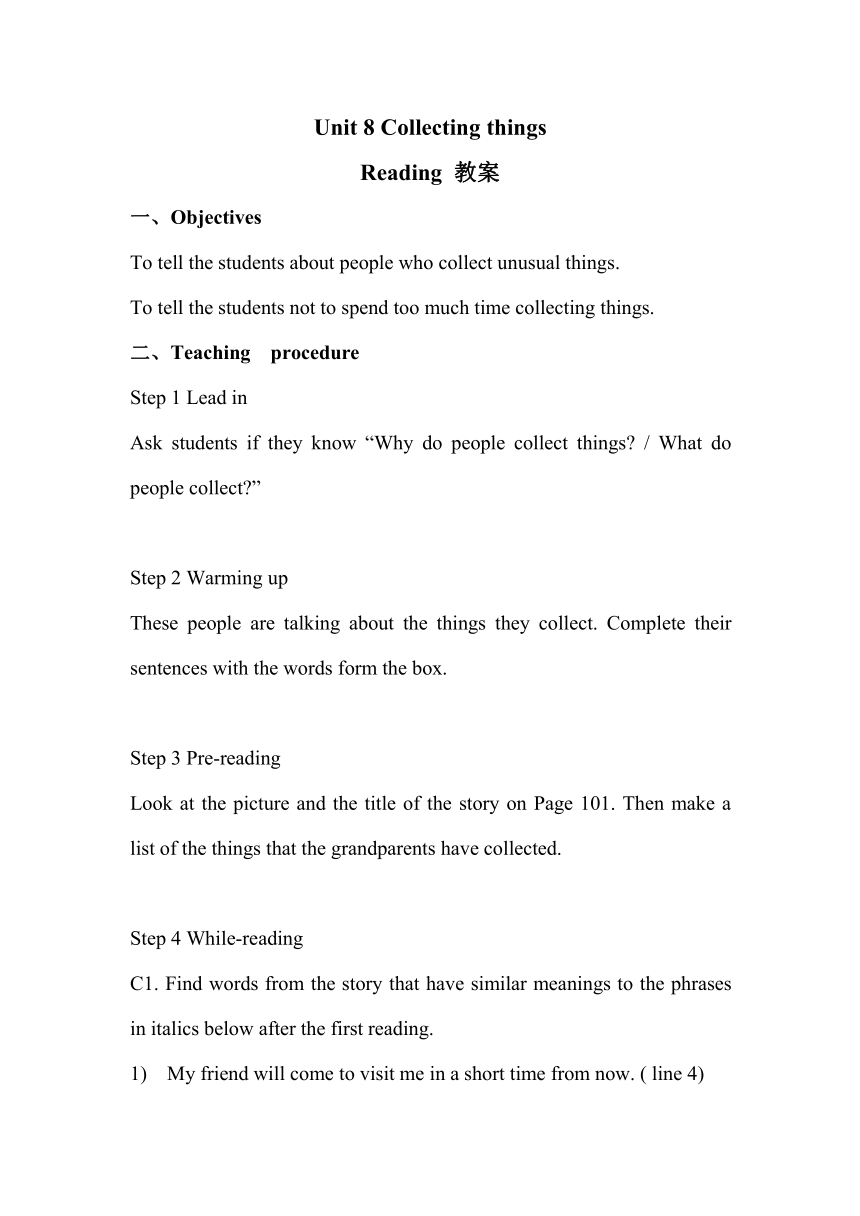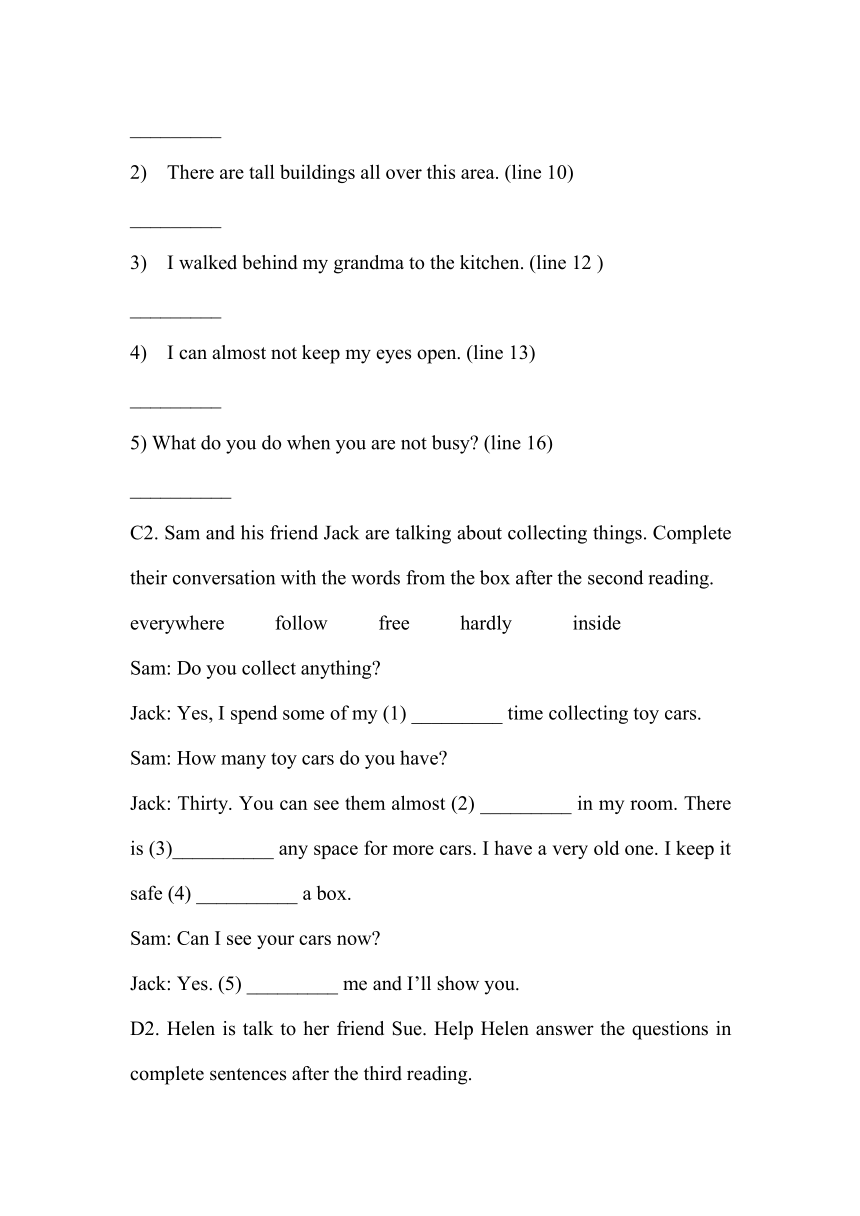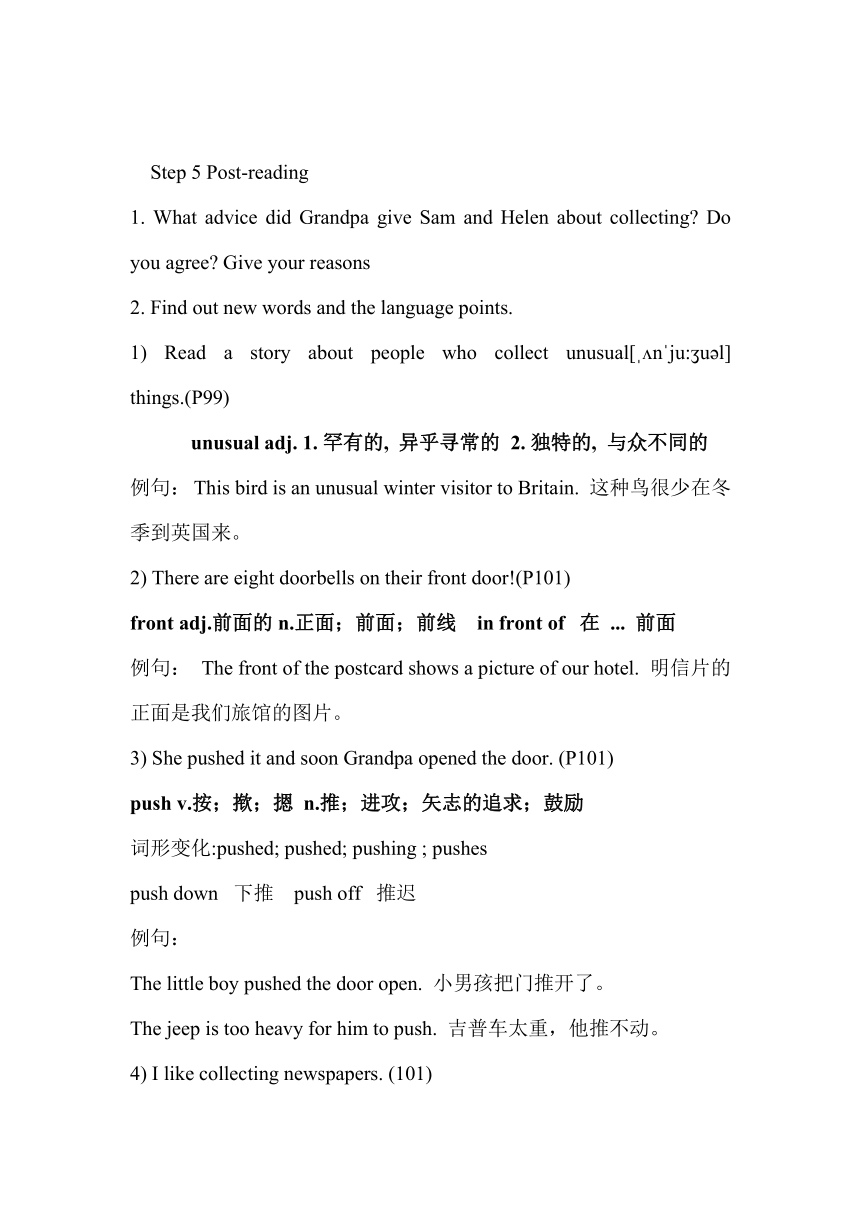Unit 8 Collecting things Reading 教案
文档属性
| 名称 | Unit 8 Collecting things Reading 教案 |  | |
| 格式 | zip | ||
| 文件大小 | 13.1KB | ||
| 资源类型 | 教案 | ||
| 版本资源 | 牛津深圳版 | ||
| 科目 | 英语 | ||
| 更新时间 | 2016-09-30 06:49:56 | ||
图片预览



文档简介
Unit
8
Collecting
things
Reading
教案
一、Objectives
To
tell
the
students
about
people
who
collect
unusual
things.
To
tell
the
students
not
to
spend
too
much
time
collecting
things.
二、Teaching
procedure
Step
1
Lead
in
Ask
students
if
they
know
“Why
do
people
collect
things
/
What
do
people
collect ”
Step
2
Warming
up
These
people
are
talking
about
the
things
they
collect.
Complete
their
sentences
with
the
words
form
the
box.
Step
3
Pre-reading
Look
at
the
picture
and
the
title
of
the
story
on
Page
101.
Then
make
a
list
of
the
things
that
the
grandparents
have
collected.
Step
4
While-reading
C1.
Find
words
from
the
story
that
have
similar
meanings
to
the
phrases
in
italics
below
after
the
first
reading.
1)
My
friend
will
come
to
visit
me
in
a
short
time
from
now.
(
line
4)
_________
2)
There
are
tall
buildings
all
over
this
area.
(line
10)
_________
3)
I
walked
behind
my
grandma
to
the
kitchen.
(line
12
)
_________
4)
I
can
almost
not
keep
my
eyes
open.
(line
13)
_________
5)
What
do
you
do
when
you
are
not
busy
(line
16)
__________
C2.
Sam
and
his
friend
Jack
are
talking
about
collecting
things.
Complete
their
conversation
with
the
words
from
the
box
after
the
second
reading.
everywhere
follow
free
hardly
inside
Sam:
Do
you
collect
anything
Jack:
Yes,
I
spend
some
of
my
(1)
_________
time
collecting
toy
cars.
Sam:
How
many
toy
cars
do
you
have
Jack:
Thirty.
You
can
see
them
almost
(2)
_________
in
my
room.
There
is
(3)__________
any
space
for
more
cars.
I
have
a
very
old
one.
I
keep
it
safe
(4)
__________
a
box.
Sam:
Can
I
see
your
cars
now
Jack:
Yes.
(5)
_________
me
and
I’ll
show
you.
D2.
Helen
is
talk
to
her
friend
Sue.
Help
Helen
answer
the
questions
in
complete
sentences
after
the
third
reading.
Step
5
Post-reading
1.
What
advice
did
Grandpa
give
Sam
and
Helen
about
collecting
Do
you
agree
Give
your
reasons
2.
Find
out
new
words
and
the
language
points.
1)
Read
a
story
about
people
who
collect
unusual[ n ju: u l]
things.(P99)
unusual
adj.
1. 罕有的,
异乎寻常的
2. 独特的,
与众不同的
例句:
This
bird
is
an
unusual
winter
visitor
to
Britain.
这种鸟很少在冬季到英国来。
2)
There
are
eight
doorbells
on
their
front
door!(P101)
front
adj.前面的n.正面;前面;前线
in
front
of
在
...
前面
例句:
The
front
of
the
postcard
shows
a
picture
of
our
hotel.
明信片的正面是我们旅馆的图片。
3)
She
pushed
it
and
soon
Grandpa
opened
the
door.
(P101)
push
v.按;揿;摁
n.推;进攻;矢志的追求;鼓励
词形变化:pushed;
pushed;
pushing
;
pushes
push
down
下推
push
off
推迟
例句:
The
little
boy
pushed
the
door
open.
小男孩把门推开了。
The
jeep
is
too
heavy
for
him
to
push.
吉普车太重,他推不动。
4)
I
like
collecting
newspapers.
(101)
newspaper [ nju zpe p (r)]
n.报纸
复数形式:newspapers
例句:
He
unfurled
the
newspaper
and
began
to
read.
他展开报纸开始阅读。
My
grandpa
has
all
kinds
of
newspapers.
我爷爷有各种报纸。
5)
They
went
inside
and
saw
newspapers
everywhere.(101)
inside
adv.向里面
everywhere通常用作副词,其之前不需要用
in,
at,
to之类的介词。如:
He
takes
his
dog
with
him
everywhere.
他无论到哪儿都带着他的狗。
注:有时根据需要可与介词
from
连用。如:
Congratulations
poured
in
from
everywhere.
祝贺像潮水一样从四面八方涌来。
6)
The
children
followed
her
into
the
living
room
and
saw
lots
of
toys
there.(101)
follow
v.
跟着;跟随
词形变化:
followed;
followed;
following;
follows
例句:
Follow
the
river
and
you
will
get
to
the
sea.
沿着河你就会走到海边
It
is
easier
to
give
good
counsel
than
to
follow
it.
提出忠告易,
照著办事难。
spend的用法
(1)
在使用spend时,主语只能是表示人的名词或代词。例如:
Andy
spent
a
lot
of
money
on
books.
安迪花了很多钱买书。
(2)
若表示"在......上花费(时间、金钱等)",常用句型spend
some
money/
some
time
on
sth,介词on之后接名词或代词。例如:
Kitty
spends
two
hours
on
her
homework
every
day.
凯蒂每天花两个小时做家庭作业。
(3)
若表示"花费(时间、金钱等)做某事",则常用句型spend
some
money
/
some
time
(in)
doing
sth,此时第二个动词要用动词ing形式,介词in可以省略。例如:
They
spent
4450
yuan
(in)
buying
the
big
colour
TV
set.
他们花了花了4450元买那台大彩电。
另外,spend也有"度过"的意思。例如:
They
want
to
spend
their
summer
holiday
in
the
country.
他们想去乡下过暑假。
3.
Let’s
do
some
exercises:
(Group
works)
This
bird
is
an
__________winter
visitor
to
Britain.
这种鸟很少在冬季到英国来。
The_________
of
the
postcard
shows
a
picture
of
our
hotel.
明信片的正面是我们旅馆的图片
The
little
boy
________the
door
open.小男孩把门推开了。
The
jeep
is
too
heavy
for
him
to_______.吉普车太重,他推不动。
He
unfurled
the
_________and
began
to
read.他展开报纸开始阅读。
My
grandpa
has
all
kinds
of
__________.我爷爷有各种报纸。
I
looked
_________for
it.
我到处都找过它了。
Congratulations
poured
in_________
everywhere.
祝贺像潮水一样从四面八方涌来。
Step
6
Homework
1.
Copy
the
new
words.
2.
Ask
students
to
read
the
story
again.
8
Collecting
things
Reading
教案
一、Objectives
To
tell
the
students
about
people
who
collect
unusual
things.
To
tell
the
students
not
to
spend
too
much
time
collecting
things.
二、Teaching
procedure
Step
1
Lead
in
Ask
students
if
they
know
“Why
do
people
collect
things
/
What
do
people
collect ”
Step
2
Warming
up
These
people
are
talking
about
the
things
they
collect.
Complete
their
sentences
with
the
words
form
the
box.
Step
3
Pre-reading
Look
at
the
picture
and
the
title
of
the
story
on
Page
101.
Then
make
a
list
of
the
things
that
the
grandparents
have
collected.
Step
4
While-reading
C1.
Find
words
from
the
story
that
have
similar
meanings
to
the
phrases
in
italics
below
after
the
first
reading.
1)
My
friend
will
come
to
visit
me
in
a
short
time
from
now.
(
line
4)
_________
2)
There
are
tall
buildings
all
over
this
area.
(line
10)
_________
3)
I
walked
behind
my
grandma
to
the
kitchen.
(line
12
)
_________
4)
I
can
almost
not
keep
my
eyes
open.
(line
13)
_________
5)
What
do
you
do
when
you
are
not
busy
(line
16)
__________
C2.
Sam
and
his
friend
Jack
are
talking
about
collecting
things.
Complete
their
conversation
with
the
words
from
the
box
after
the
second
reading.
everywhere
follow
free
hardly
inside
Sam:
Do
you
collect
anything
Jack:
Yes,
I
spend
some
of
my
(1)
_________
time
collecting
toy
cars.
Sam:
How
many
toy
cars
do
you
have
Jack:
Thirty.
You
can
see
them
almost
(2)
_________
in
my
room.
There
is
(3)__________
any
space
for
more
cars.
I
have
a
very
old
one.
I
keep
it
safe
(4)
__________
a
box.
Sam:
Can
I
see
your
cars
now
Jack:
Yes.
(5)
_________
me
and
I’ll
show
you.
D2.
Helen
is
talk
to
her
friend
Sue.
Help
Helen
answer
the
questions
in
complete
sentences
after
the
third
reading.
Step
5
Post-reading
1.
What
advice
did
Grandpa
give
Sam
and
Helen
about
collecting
Do
you
agree
Give
your
reasons
2.
Find
out
new
words
and
the
language
points.
1)
Read
a
story
about
people
who
collect
unusual[ n ju: u l]
things.(P99)
unusual
adj.
1. 罕有的,
异乎寻常的
2. 独特的,
与众不同的
例句:
This
bird
is
an
unusual
winter
visitor
to
Britain.
这种鸟很少在冬季到英国来。
2)
There
are
eight
doorbells
on
their
front
door!(P101)
front
adj.前面的n.正面;前面;前线
in
front
of
在
...
前面
例句:
The
front
of
the
postcard
shows
a
picture
of
our
hotel.
明信片的正面是我们旅馆的图片。
3)
She
pushed
it
and
soon
Grandpa
opened
the
door.
(P101)
push
v.按;揿;摁
n.推;进攻;矢志的追求;鼓励
词形变化:pushed;
pushed;
pushing
;
pushes
push
down
下推
push
off
推迟
例句:
The
little
boy
pushed
the
door
open.
小男孩把门推开了。
The
jeep
is
too
heavy
for
him
to
push.
吉普车太重,他推不动。
4)
I
like
collecting
newspapers.
(101)
newspaper [ nju zpe p (r)]
n.报纸
复数形式:newspapers
例句:
He
unfurled
the
newspaper
and
began
to
read.
他展开报纸开始阅读。
My
grandpa
has
all
kinds
of
newspapers.
我爷爷有各种报纸。
5)
They
went
inside
and
saw
newspapers
everywhere.(101)
inside
adv.向里面
everywhere通常用作副词,其之前不需要用
in,
at,
to之类的介词。如:
He
takes
his
dog
with
him
everywhere.
他无论到哪儿都带着他的狗。
注:有时根据需要可与介词
from
连用。如:
Congratulations
poured
in
from
everywhere.
祝贺像潮水一样从四面八方涌来。
6)
The
children
followed
her
into
the
living
room
and
saw
lots
of
toys
there.(101)
follow
v.
跟着;跟随
词形变化:
followed;
followed;
following;
follows
例句:
Follow
the
river
and
you
will
get
to
the
sea.
沿着河你就会走到海边
It
is
easier
to
give
good
counsel
than
to
follow
it.
提出忠告易,
照著办事难。
spend的用法
(1)
在使用spend时,主语只能是表示人的名词或代词。例如:
Andy
spent
a
lot
of
money
on
books.
安迪花了很多钱买书。
(2)
若表示"在......上花费(时间、金钱等)",常用句型spend
some
money/
some
time
on
sth,介词on之后接名词或代词。例如:
Kitty
spends
two
hours
on
her
homework
every
day.
凯蒂每天花两个小时做家庭作业。
(3)
若表示"花费(时间、金钱等)做某事",则常用句型spend
some
money
/
some
time
(in)
doing
sth,此时第二个动词要用动词ing形式,介词in可以省略。例如:
They
spent
4450
yuan
(in)
buying
the
big
colour
TV
set.
他们花了花了4450元买那台大彩电。
另外,spend也有"度过"的意思。例如:
They
want
to
spend
their
summer
holiday
in
the
country.
他们想去乡下过暑假。
3.
Let’s
do
some
exercises:
(Group
works)
This
bird
is
an
__________winter
visitor
to
Britain.
这种鸟很少在冬季到英国来。
The_________
of
the
postcard
shows
a
picture
of
our
hotel.
明信片的正面是我们旅馆的图片
The
little
boy
________the
door
open.小男孩把门推开了。
The
jeep
is
too
heavy
for
him
to_______.吉普车太重,他推不动。
He
unfurled
the
_________and
began
to
read.他展开报纸开始阅读。
My
grandpa
has
all
kinds
of
__________.我爷爷有各种报纸。
I
looked
_________for
it.
我到处都找过它了。
Congratulations
poured
in_________
everywhere.
祝贺像潮水一样从四面八方涌来。
Step
6
Homework
1.
Copy
the
new
words.
2.
Ask
students
to
read
the
story
again.
